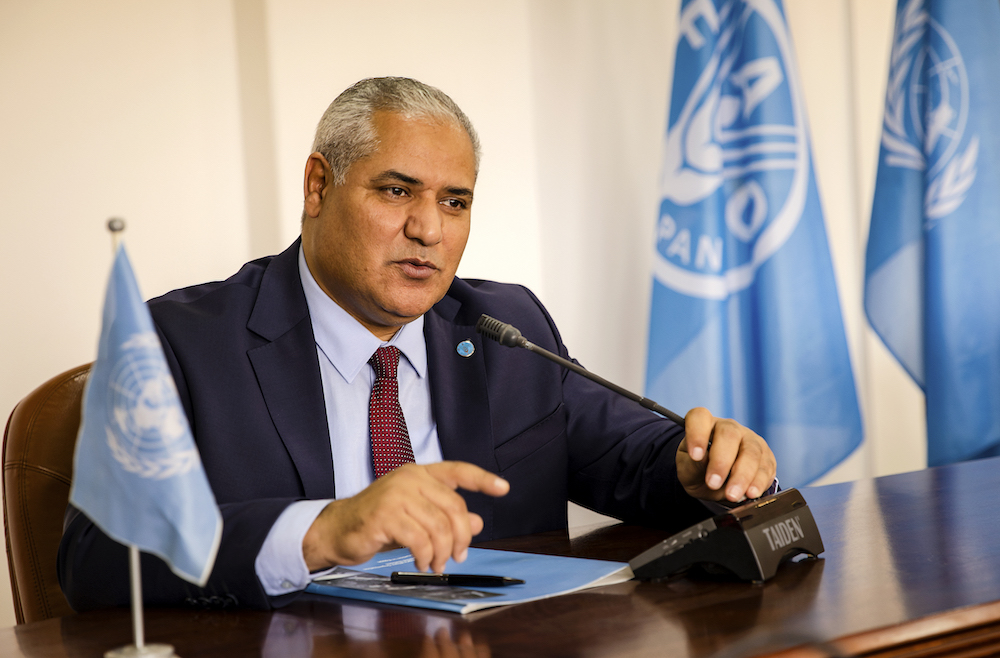NEW YORK CITY: Food security in the Near East and North Africa could be strengthened immeasurably if regional nations weaned themselves off their heavy reliance on foreign imports, Abdulhakim Elwaer, assistant director-general and regional representative for the Near East and North Africa at the Food and Agriculture Organization of the UN, told Arab News.
Countries in the NENA region rely extensively on imported food items to feed their domestic populations. In fact, FAO predicts that the region will meet 63 percent of its caloric demand through imports by 2030, leaving it even more exposed to supply-chain disruptions and price fluctuations.
“This situation renders the region vulnerable to supply-side shocks caused by economic or natural factors, such as COVID-19 and inherent regional and country-level stressors such as protracted conflicts, political instability and climate change,” said Elwaer, speaking ahead of the 36th session of FAO’s Regional Conference for the Near East, NERC 36, which was held in the Iraqi capital Baghdad on Feb. 7-8.
“The region is particularly weak when it comes to intra-regional trade. For example in 2019, only 15.4 percent of the Arab region’s food imports were from within the region,” said Elwaer, attributing this to “the lack of harmonization of regulatory systems, weak logistics infrastructure and trade facilitation mechanisms.”
“It is therefore imperative to recognize, internalize in national policies, and optimize the role of trade in food security in the NENA region. By bridging demand and supply, trade could play an important role in climate change adaptation and mitigating external shocks.”
The region’s excessive reliance on food imports has become entrenched through decades of crisis, instability and neglect of agriculture.
For example, Iraq imports almost 50 percent of its food needs. In the event of global food supply chain shocks or the collapse of the state budget owing to war or a drop in oil prices, the food system becomes vulnerable.
The imbalance is even more pronounced in the UAE, whose exposure to global food price fluctuations is borne out by the quantity of imported food as a percentage of the overall mix in 2019: 80-90.
From conflict and socio-economic upheaval to environmental degradation, the list of challenges facing food-producing communities throughout the NENA region seems to grow with every passing year.
With just 5 percent of the region’s land deemed arable, and freshwater supplies depleting rapidly, the result has been a steady flow of internal migration from the villages to the cities, further undermining domestic food production in favor of imports.
One knock-on effect has been a deteriorating standard of nutrition, with cheap, high-energy carbohydrates taking the place of more costly fresh fruits and vegetables on the dinner tables of deprived households, creating health problems associated with vitamin deficiencies.
Matters have been made worse by the COVID-19 pandemic, which has upset supply chains and destroyed livelihoods, raising the number of undernourished people in the region by a further 15 percent to 69 million in 2020.
“The recent trends in hunger and food insecurity suggest that it will be enormously difficult for the region to achieve, by 2030, UN Sustainable Development Goal number two: Zero hunger,” Elwaer said.
Indeed, the region was well behind on matters of food security long before the pandemic struck
“The region had already been off-track in eliminating hunger and food insecurity because of pre-existing vulnerabilities and exposure to multiple shocks and stresses, such as climate change, water scarcity, conflicts and protracted crises, agriculture productivity and yield challenges, social inequalities and poverty, and, at present, rising food price,” Elwaer said.
NERC 36, held in a hybrid format under the theme “Recover and Restart: Innovations for better, greener and more resilient agri-food systems to achieve the sustainable development goals,” examined how the region might transform its agri-food systems to guarantee the public’s access to an affordable and nutritious diet.
Elwaer said this could be achieved through FAO’s Strategic Framework, the so-called Four Betters: “Better production, better nutrition, better environment and better life, leaving no one behind.”
The framework was endorsed by the region’s agricultural ministers at the conclusion of NERC 36, along with FAO’s priorities for the region, which focus on “generating employment opportunities for rural youth, promoting food security and healthy diets for all through trade, food safety, doing more to reduce food loss and waste, greening agricultural practices to ensure environmental sustainability.”
Regardless of what policies governments enact, however, Elwaer said that climate change remains the single greatest threat to regional agriculture and food systems — particu

